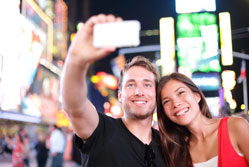Are your staff taking a statuscation?
Are your staff taking a statuscation?
 Back in the day — as long as three or maybe four years ago — a two-week holiday was a two-week holiday.
Back in the day — as long as three or maybe four years ago — a two-week holiday was a two-week holiday.
We’d fly off somewhere exciting and our colleagues wouldn’t hear from us until we returned 14 days later, with a fading tan and some blurry photos.
But if new research from travel firm The Flash Pack is to be believed, in 2014 the two-week holiday is changing. Social media sites are helping us stretch and transform it into a two-month ‘statuscation’.
According to the survey of 1,000 people, 84% of Brits regularly use social media sites like Facebook, Twitter and Instagram to elongate the effects of their breaks abroad.
Apparently, a statuscation doesn’t just involve bragging about your amazing holiday while you’re away, or once you’ve returned.
The survey found nearly 50% of people claim their statuscation starts when the booking is made, by posting Facebook updates and photos of the tickets when they arrive.
A third of all travellers can’t resist uploading pictures of their airport departure board, the runway and even the view out of the plane window.
Nearly 65% of people say they share images and updates with friends and family while they’re away. And on their return, 37% claim they keep the holiday vibe going by connecting with newfound holiday companions online and then sharing photos and memories.
Life coach Fiona Harrold reckons taking a statuscation can have a positive impact on holidaymakers:
“Why should the positive and beneficial effects of our trips abroad evaporate as soon as we touch down? This new breed of ‘statuscationers’ have found a superb, efficient and cheap way to keep that positivity going through, almost to the next holiday”
But strangely, she doesn’t seem to have commented on the effects your statuscation might have on others.
We can’t help thinking it’s less likely to spread the feel-good factor of your holiday and more likely to generate irritation and jealousy.
On the whole then, maybe statuscations are best kept outside of the workplace.




Comments
Add a comment